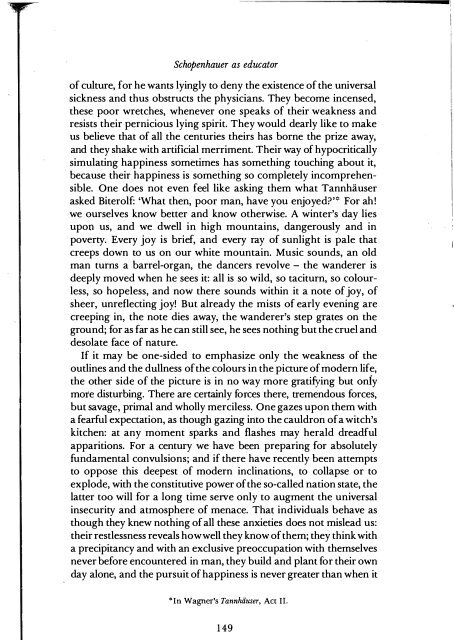Friedrich_Nietzsche - Untimely_Meditations_(Cambridge_Texts_in_the_History_of_Philosophy__1997)
Friedrich_Nietzsche - Untimely_Meditations_(Cambridge_Texts_in_the_History_of_Philosophy__1997)
Friedrich_Nietzsche - Untimely_Meditations_(Cambridge_Texts_in_the_History_of_Philosophy__1997)
Create successful ePaper yourself
Turn your PDF publications into a flip-book with our unique Google optimized e-Paper software.
Schopenhauer as educator<strong>of</strong> culture, for he wants ly<strong>in</strong>gly to deny <strong>the</strong> existence <strong>of</strong> <strong>the</strong> universalsickness and thus obstructs <strong>the</strong> physicians. They become <strong>in</strong>censed,<strong>the</strong>se poor wretches, whenever one speaks <strong>of</strong> <strong>the</strong>ir weakness andresists <strong>the</strong>ir pernicious ly<strong>in</strong>g spirit. They would dearly like to makeus believe that <strong>of</strong> all <strong>the</strong> centuries <strong>the</strong>irs has borne <strong>the</strong> prize away,and <strong>the</strong>y shake with artificial merriment. Their way <strong>of</strong> hypocriticallysimulat<strong>in</strong>g happ<strong>in</strong>ess sometimes has someth<strong>in</strong>g touch<strong>in</strong>g about it,because <strong>the</strong>ir happ<strong>in</strong>ess is someth<strong>in</strong>g so completely <strong>in</strong>comprehensible.One does not even feel like ask<strong>in</strong>g <strong>the</strong>m what Tannhauserasked Biterolf: 'What <strong>the</strong>n, poor man, have you enjoyed?'* For ah !we ourselves know better and know o<strong>the</strong>rwise. A w<strong>in</strong>ter's day liesupon us, and we dwell <strong>in</strong> high mounta<strong>in</strong>s, dangerously and <strong>in</strong>poverty. Every joy is brief, and every ray <strong>of</strong> sunlight is pale thatcreeps down to us on our white mounta<strong>in</strong>. Music sounds, an oldman turns a barrel-organ, <strong>the</strong> dancers revolve - <strong>the</strong> wanderer isdeeply moved when he sees it: all is so wild, so taciturn, so colourless,so hopeless, and now <strong>the</strong>re sounds with<strong>in</strong> it a note <strong>of</strong> joy, <strong>of</strong>sheer, unreflect<strong>in</strong>g joy! But already <strong>the</strong> mists <strong>of</strong> early even<strong>in</strong>g arecreep<strong>in</strong>g <strong>in</strong>, <strong>the</strong> note dies away, <strong>the</strong> wanderer's step grates on <strong>the</strong>ground; for as far as he can still see, he sees noth<strong>in</strong>g but <strong>the</strong> cruel anddesolate face <strong>of</strong> nature.If it may be one-sided to emphasize only <strong>the</strong> weakness <strong>of</strong> <strong>the</strong>outl<strong>in</strong>es and <strong>the</strong> dullness <strong>of</strong> <strong>the</strong> colours <strong>in</strong> <strong>the</strong> picture <strong>of</strong> modern life,<strong>the</strong> o<strong>the</strong>r side <strong>of</strong> <strong>the</strong> picture is <strong>in</strong> no way more gratify<strong>in</strong>g but oniymote disturb<strong>in</strong>g. There are certa<strong>in</strong>ly fo rces <strong>the</strong>re, tremendous forces,but savage, primal and wholly merciless. One gazes upon <strong>the</strong>m witha fearful expectation, as though gaz<strong>in</strong>g <strong>in</strong>to <strong>the</strong> cauldron <strong>of</strong> a witch'skitchen: at any moment sparks and flashes may herald dreadfulapparitions. For a century we have been prepar<strong>in</strong>g for absolutelyfu ndamental convulsions; and if <strong>the</strong>re have recently been attemptsto oppose this deepest <strong>of</strong> modern <strong>in</strong>cl<strong>in</strong>ations, to collapse or toexplode, with <strong>the</strong> constitutive power <strong>of</strong> <strong>the</strong> so-called nation state, <strong>the</strong>latter too will for a long time serve only to augment <strong>the</strong> universal<strong>in</strong>security and atmosphere <strong>of</strong> menace. That <strong>in</strong>dividuals behave asthough <strong>the</strong>y knew noth<strong>in</strong>g <strong>of</strong> all <strong>the</strong>se anxieties does not mislead us:<strong>the</strong>ir restlessness reveals how well <strong>the</strong>y know <strong>of</strong> <strong>the</strong>m; <strong>the</strong>y th<strong>in</strong>k witha precipitancy and with an exclusive preoccupation with <strong>the</strong>mselvesnever before encountered <strong>in</strong> man, <strong>the</strong>y build and plant fo r <strong>the</strong>ir ownday alone, and <strong>the</strong> pursuit <strong>of</strong> happ<strong>in</strong>ess is never greater than when it*In Wagner's Ta nnhiiuser, Act II.149


